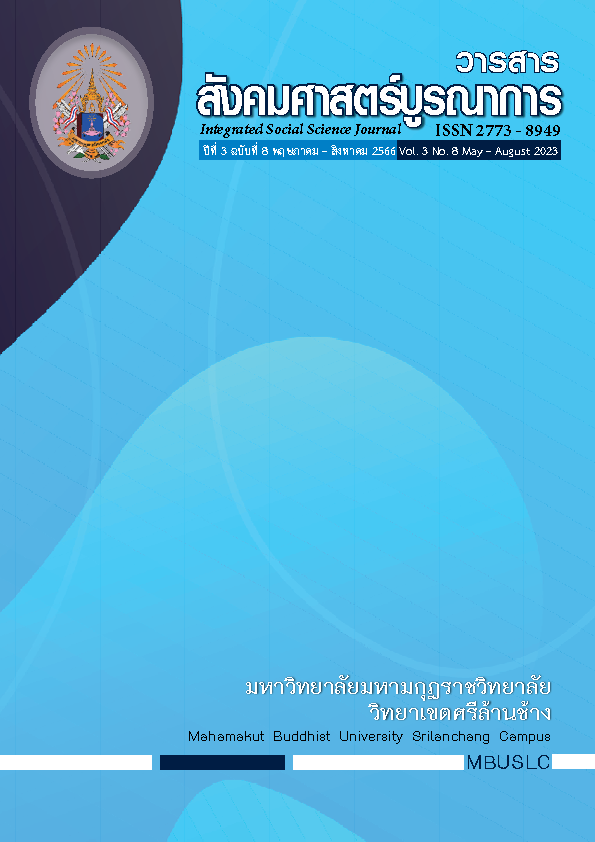THE MANAGEMENT OF STUDENT SUPPORT SYSTEMS IN THE DIGITAL AGE BY THE PRINCIPLE OF FOUR SANGAHAVATHU IN SCHOOL UNDER LOEI PRIMARY EDUCATIONAL SERVICE AREA OFFICE 1
Main Article Content
Abstract
The objectives of this research were 1. to study the management of student support systems in the digital age in school, 2. to study the management of student support systems in the digital age by the principle of Four Sangahavathu in school and 3. to search the guidelines the management of student support systems in the digital age by the principle of Four Sangahavathu in school under Loei Primary Educational Service Area Office 1. The samples using for this research were 302 persons. The instruments using for this research were the 5 rating scales questionnaires with the confidence of 0.98 and Interview form. The statistics using for data analysis included frequency, percentage, mean and standard deviation. The research results were found that: 1. For overall or the management of student support systems in the digital age in school were on high level. Considering on each aspect, there were founded that the aspect with the heights level was the protection and problems, but the aspect with the lowest level was on the support for students. 2. For overall on the management of student support systems in the digital age by the principle of Four Sangahavathu in school the management of student support systems in the digital age by the principle of Four Sangahavathu in school under Loei Primary Educational Service Area Office 1 were on highest level, Considering on each aspect the were founded that the aspect with the highest level was the equaling (Samānattatā), but, the aspect with the lowest level was the donation (Dāna). 3. The guidelines on the management of student support systems in the digital age by the principle of Four Sangahavathu in school were founded that the administrators should be on giving opportunity for teachers and students for participation on planning and view for operation of taking care and helping for the students, support for the budget and activities for instilling the virtue and ethics for the students at usual time, limit on policy on speaking good speech on sincerity, support and admiring on operation of personals, using good speech for love, harmony and giving willpower, giving opportunity to personals, students and communities on development, improvement and using technology media on the system of tarring care and helping for the students on the whole time, management for the environment of the schools on appropriation, promotion and support the activities by using the principle of virtue, service for data and information, speeding and communication for the operation on taking care and helping for the students.
Article Details

This work is licensed under a Creative Commons Attribution-NonCommercial-NoDerivatives 4.0 International License.
บทความที่ได้รับการพิจารณาจากคณะกรรมการผู้ทรงคุณวุฒิและเผยแผ่ในวารสารฉบับนี้ เป็นทัศนคติและข้อคิดเห็นส่วนบุคคลของผู้เขียนแต่ละท่าน ไม่ถือว่าเป็นทัศนะคติและความรับผิดชอบ
ของบรรณาธิการ
บทความ ข้อมูล เนื้อหา รูปภาพ ฯลฯ ที่ได้รับการตีพิมพ์ในวารสารสังคมศาสตร์บูรณาการ ถือเป็นลิขสิทธิ์ของวารสารสังคมศาสตร์บูรณาการ หากบุคคลหรือหน่วยงานใดต้องการนำทั้งหมดหรือส่วนหนึ่งส่วนใดไปเผยแพร่ต่อหรือเพื่อกระทำการใด ๆ จะต้องได้รับอนุญาตเป็นลายลักอักษรจากวารสารสังคมศาสตร์บูรณาการ ก่อนเท่านั้น
References
จักรพงษ์ ตระการไทย. (2564). การดำเนินการงานระบบดูแลช่วยเหลือนักเรียนในสถานศึกษายุคดิจิทัล.
วารสารบริหารการศึกษาบัวบัณฑิต. 21(1). มกราคม-มีนาคม 2564
จักรกฤต หาพา. (2564). แนวทางการส่งเสริมการบริหารงานกิจการนักเรียนตามหลักสังคหวัตถุ 4 ของโรงเรียนเฉพาะความพิการ สังกัดสำนักบริหารงานการศึกษาพิเศษกลุ่ม 4. Journal of Modern Learning Development. 6(1). มกราคม – กุมภาพันธ์ 2564.
ญาณิศา เยี่ยมสิริวุฒิ. (2564). การจัดการระบบดูแลช่วยเหลือนักเรียนของสถานศึกษา สังกัดสำนักงานเขตพื้นที่การศึกษาประถมศึกษาสงขลา เขต 3. สารนิพนธ์ ศษ.ม. (การบริหารการศึกษา). สงขลา: บัณฑิตวิทยาลัย มหาวิทยาลัยหาดใหญ่.
บุญชม ศรีสะอาด. (2554). การวิจัยเบื้องต้น. (พิมพ์ครั้งที่ 9). กรุงเทพมหานคร: สุวีริยาสาส์น.
ปฏิมากร ศิริเตชะ. (2549). ปัจจัยทางสังคม ลักษณะทางชีวสังคมที่เกี่ยวข้องกับพฤติกรรมที่เอื้อต่อสังคมตามหลักธรรมสังคหวัตถุ 4. ปริญญานิพนธ์ วท.ม. (การวิจัยพฤติกรรมศาสตร์ประยุกต์). กรุงเทพมหานคร: บัณฑิตวิทยาลัย มหาวิทยาลัยศรีนครินทรวิโรฒ
ศตวรรษ กฤษณา. (2564). การบริหารงานกิจการนักเรียนตามหลักสังคหวัตถุ 4 ในโรงเรียนมัธยมศึกษา อำเภอมหาชนะชัย จังหวัดยโสธร สังกัดสำนักงานเขตพื้นที่การศึกษามัธยมศึกษา เขต 28. วารสารการบริหารการศึกษา มมร.วิทยาเขตร้อยเอ็ด, 1(1), มกราคม – เมษายน 2564.
สำนักงานคณะกรรมการพัฒนาเศรษฐกิจและสังคมแห่งชาติ. (2560). แผนพัฒนาเศรษฐกิจและสังคมแห่งชาติ ฉบับที่ 12 (พ.ศ. 2560-2564). กรุงเทพมหานคร: สำนักงานคณะกรรมการพัฒนาเศรษฐกิจ และสังคมแห่งชาติ
Krejcie, R. V. & Morgan, D. W. (1970). Determining Sample Size for Research Activities. Educational and Psychological Measurement. 30(3).

